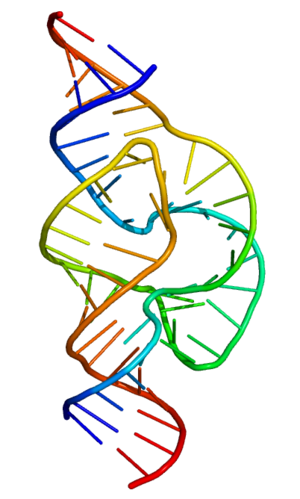 Image via Wikipedia
Image via WikipediaThe drying lagoon claim is not unique. In a similar spirit, other prebiotic chemists have invoked freezing glacial lakes, mountainside freshwater ponds, flowing streams, beaches, dry deserts, volcanic aquifers and the entire global ocean (frozen or warm as needed) to support their requirement that the "nucleotide soup" necessary for RNA synthesis would somehow have come into existence on the early Earth.There is absolutely nothing wrong with scientists trying to hypothesize how life may have formed on earth through natural means; that is their job, and I applaud their efforts. But, when their approach of methodological naturalism is matched with an insistence that naturalism also be upheld in the conclusion reached, regardless of the actual evidence, they may be scientists but they have become something less than full, inquiring human beings asking without constraint, "how?", and, more importantly, "why?". Science ceases to be a search for truth and becomes a search for an answer that fits the methods of our quest and our worldview assumptions. This regrettable impoverishment of spirit is seen clearly in the writings of Richard Dawkins.
Here's one of the best analogies I've come across to illustrate the problem with scientists' efforts in this area:
The analogy that comes to mind is that of a golfer, who having played a golf ball through an 18-hole course, then assumed that the ball could also play itself around the course in his absence. He had demonstrated the possibility of the event; it was only necessary to presume that some combination of natural forces (earthquakes, winds, tornadoes and floods, for example) could produce the same result, given enough time. No physical law need be broken for spontaneous RNA formation to happen, but the chances against it are so immense, that the suggestion implies that the non-living world had an innate desire to generate RNA. The majority of origin-of-life scientists who still support the RNA-first theory either accept this concept (implicitly, if not explicitly) or feel that the immensely unfavorable odds were simply overcome by good luck.Embedded in the quote are the options on the table: "The non-living world had an innate desire to generate RNA". This is a form of vitalism. This is entirely consistent with theistic evolution and/or the soft version of intelligent design, and a rather desperate version of darwinism. "Immensely unfavorable odds simply overcome by good luck". Consistent with classic darwinism. The third option is the stronger form of intelligent design - an intelligent agent intervened in nature to produce life on Earth. Unfortunately, this option is not really on the table, because it's the darwinist's table, and if you try to put it on the table, he'll say he's "not playing", take his table and go home.
















































